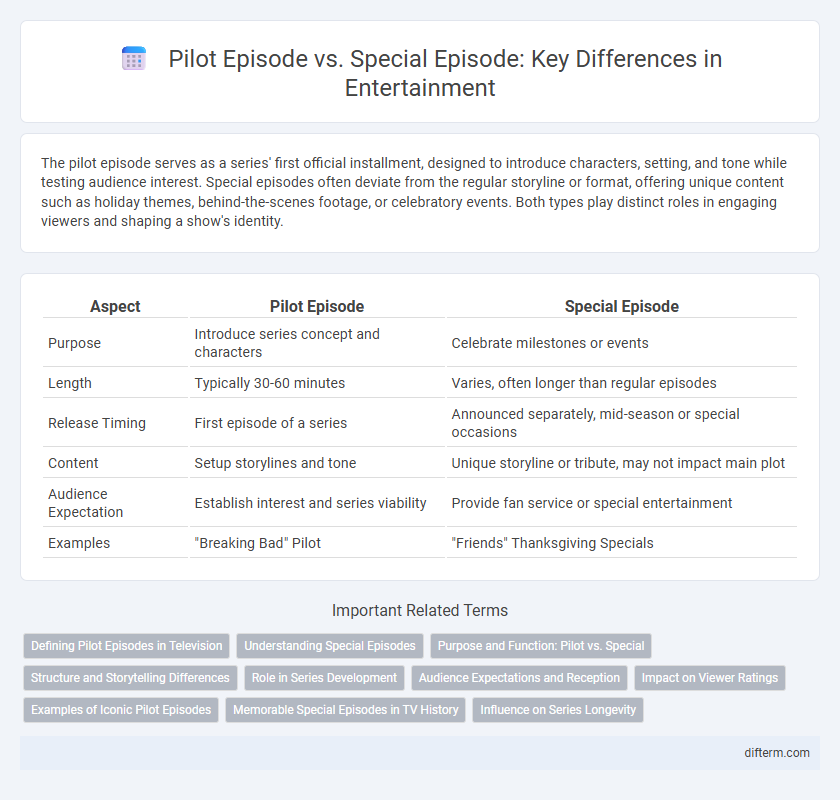The pilot episode serves as a series' first official installment, designed to introduce characters, setting, and tone while testing audience interest. Special episodes often deviate from the regular storyline or format, offering unique content such as holiday themes, behind-the-scenes footage, or celebratory events. Both types play distinct roles in engaging viewers and shaping a show's identity.
Table of Comparison
| Aspect | Pilot Episode | Special Episode |
|---|---|---|
| Purpose | Introduce series concept and characters | Celebrate milestones or events |
| Length | Typically 30-60 minutes | Varies, often longer than regular episodes |
| Release Timing | First episode of a series | Announced separately, mid-season or special occasions |
| Content | Setup storylines and tone | Unique storyline or tribute, may not impact main plot |
| Audience Expectation | Establish interest and series viability | Provide fan service or special entertainment |
| Examples | "Breaking Bad" Pilot | "Friends" Thanksgiving Specials |
Defining Pilot Episodes in Television
Pilot episodes in television serve as the initial installment created to showcase the concept, characters, and tone of a new series, often used by networks to decide on series approval. These episodes are structured to introduce the central narrative and attract audience interest, setting the foundation for potential full-season production. Unlike special episodes, which are standalone or commemorative, pilot episodes directly aim to launch and establish a series within the competitive TV market.
Understanding Special Episodes
Special episodes in television series often deviate from the regular narrative structure, offering unique storylines, thematic elements, or holiday-themed content that sets them apart from pilot episodes. Unlike pilot episodes, which primarily serve to introduce characters, settings, and overall series concepts, special episodes aim to engage audiences through memorable events or celebrations that may not directly advance the main plot. These episodes are designed to boost viewer interest, mark milestones, or explore creative storytelling outside the series' usual format.
Purpose and Function: Pilot vs. Special
A pilot episode serves as a test to showcase a show's concept, characters, and tone to networks or streaming platforms, aiming to secure a full series order. Special episodes function to engage audiences through unique content such as holiday themes, cast reunions, or behind-the-scenes features, enhancing fan loyalty and viewership without progressing the main storyline. The pilot sets the foundation for a series' development, whereas specials focus on celebration, promotion, or audience retention.
Structure and Storytelling Differences
Pilot episodes are designed to introduce main characters, establish the setting, and outline the primary conflict, serving as a testing ground to gauge audience interest. Special episodes typically deviate from the ongoing narrative, featuring unique themes or events that provide additional backstory or celebrate milestones. The structure of a pilot centers on foundational storytelling to launch a series, while specials prioritize standalone plots or festive content without advancing the main arc.
Role in Series Development
A pilot episode serves as a critical test that introduces characters, tone, and plot, determining whether a series is greenlit for production; it establishes the foundational narrative and style that influence future episodes. In contrast, a special episode often airs after a series is established, designed to engage audiences with unique content such as holiday themes or crossovers, enriching the existing storyline without altering the core direction. Understanding the distinct roles of pilot and special episodes is essential for grasping how television series develop and sustain viewer interest over time.
Audience Expectations and Reception
Pilot episodes establish characters and plotlines, shaping initial audience expectations and setting the tone for the series, often generating excitement and curiosity. Special episodes, typically released after a show has gained a following, cater to established fans with unique storylines or events, enhancing viewer engagement and loyalty. Audience reception to pilots tends to focus on potential and promise, while specials are judged on creativity and how well they reward ongoing viewers.
Impact on Viewer Ratings
Pilot episodes serve as a critical introduction, often generating high viewer ratings by establishing characters and plotlines that attract audience interest. Special episodes, designed to offer unique content or celebrate milestones, can temporarily boost viewer ratings by creating excitement and anticipation among fans. The sustained impact on ratings typically favors pilots, as they lay the foundation for ongoing viewer engagement and series success.
Examples of Iconic Pilot Episodes
Iconic pilot episodes such as "Pilot" of *Friends* and "The One Where It All Began" instantly establish character dynamics and tone, setting the stage for long-running success. Unlike special episodes like *Black Mirror*'s "San Junipero," pilots introduce core storylines rather than serving as standalone features or thematic explorations. Pilot episodes not only hook audiences but also define the narrative framework crucial for a series' identity in the entertainment industry.
Memorable Special Episodes in TV History
Memorable special episodes in TV history often stand out due to their unique storylines, guest stars, or significant character developments that differ from regular episodes, making them iconic moments in entertainment. Unlike pilot episodes, which are designed to introduce the characters and premise to establish a series, special episodes serve as event television that captures audience attention and drives high viewership. Examples include "The One Where Ross Finds Out" from Friends and "The Soup Nazi" from Seinfeld, both of which left lasting cultural impacts.
Influence on Series Longevity
A pilot episode serves as the foundational test to gauge audience interest and network approval, significantly impacting the likelihood of a full series order and its potential longevity. Special episodes, often designed for fan engagement or to boost ratings, can reinvigorate interest in an established series, extending its lifespan by attracting new viewers or rewarding loyal fans. The strategic success of a pilot influences initial series continuity, while special episodes contribute to sustaining and expanding a show's relevance over time.
pilot episode vs special episode Infographic

 difterm.com
difterm.com